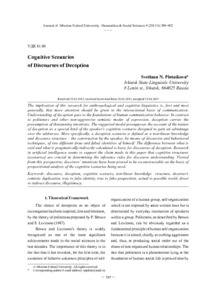Когнитивные сценарии обмана и их дискурсивная реализация
Скачать файл:
URI (для ссылок/цитирований):
https://elib.sfu-kras.ru/handle/2311/9722Автор:
Plotnikova, Svetlana N.
Плотникова, С.Н.
Дата:
2013-04Аннотация:
The implication of this research for anthropological and cognitive linguistics is, first and most generally, that more attention should be given to the interactional basis of communication. Understanding of deception goes to the foundations of human communicative behavior. In contrast to politeness and other non-aggressive semiotic modes of expression, deception carries the presumption of threatening intentions. The suggested model presupposes the account of the nature of deception as a special kind of the speaker’s cognitive scenario designed to gain an advantage over the addressee. More specifically, a deception scenario is defined as a non-linear knowledge and discourse structure – the construction by the speaker, by means of discursive and behavioral techniques, of two different (true and false) identities of himself. The difference between what is said and what is pragmatically indirectly calculated is basic for discourses of deception. Research in artificial intelligence seems to support the claim made in this paper that cognitive structures (scenarios) are crucial in determining the inference rules for discourse understanding. Viewed from this perspective, deceivers’ intentions have been proved to be reconstructable on the basis of propositional analysis of the cognitive scenarios being used. В статье доказывается, что исследование обмана является важной составной частью изучения интерактивных параматров коммуникации. Обман, направленный на выражение враждебных интенций, противопоставляется вежливости и другим неагрессивным типам коммуникативного поведения. Выявляется когнитивная природа обмана – лежащий в его основе особый когнитивный сценарий, представляющий собой нелинейную структуру знания, отражающую семиотическое удвоение обманывающего: одновременную реализацию его истинной и фальшивой идентичности. Определяется алгоритм дискурсивного конструирования фальшивой идентичности: замена действительного мира возможным, прямого дискурса – непрямым. Анализируется механизм последовательного дискурсивного выражения ложных пропозиций в трех базовых типах когнитивных сценариев обмана.

